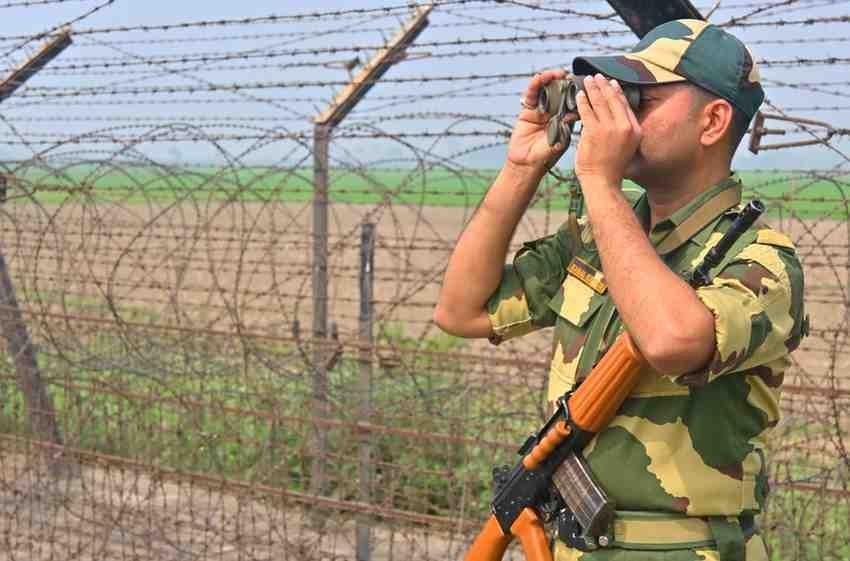India on Monday summoned Deputy High Commissioner of Bangladesh Md. Nural Islam to the foreign office, a day after Dhaka summoned Indian envoy Pranay Verma to express concern and raise ‘objections’ over fencing at the border.
This meeting was followed by the Indian diplomat being summoned by the foreign office in Dhaka on Sunday over the allegations that India was attempting to construct barbed wire fencing at five specific locations along the over 4,000-km-long Indo-Bangladeshi border.
In a statement, the Bangladesh Foreign Ministry said Indian diplomat Verma was in Ambassador Md Jashim Uddin’s office over the “recent activities of the Border Security Force (BSF)” along the Indo-Bangladesh border and told that New Delhi should avoid any “provocative actions that could intensify tensions along the shared border.”
During the meeting with the Indian diplomat, the Bangladesh foreign secretary called the fencing at the India-Bangladesh border “unauthorized” and emphasized that such activities “have caused tensions and disturbances along the border.”
India and Bangladesh share 4096.7 km. of border, which is the largest land border that India shares with any of its neighboring countries. Both countries concluded a Land Boundary Agreement (LBA) in 1974, soon after the independence of Bangladesh, to find a solution to the complex nature of border demarcation.
The agreement was implemented in its entirety with the exception of three issues pertaining to (i) undemarcated land boundaries of approximately 6.1 km in three sectors, viz. Daikhata–56 (West Bengal), Muhuri River–Belonia (Tripura), and Lathitila–Dumabari (Assam); (ii) the exchange of 111 enclaves in Bangladesh with 51 Bangladesh enclaves in India; and (iii) adverse possessions.
During the visit of the then Prime Minister Dr. Manmohan Singh to Bangladesh in September 2011, a protocol to the 1974 LBA was signed, which settled these three outstanding issues. Instruments of Ratification of the Agreement were exchanged on June 6, 2015, during Prime Minister Narendra Modi’s visit to Bangladesh.
On Sunday, Bangladesh’s Home Affairs Adviser Lt Gen (retd.) Jahangir Alam Chowdhury accused that India of having been forced to stop the construction of jagged wire fences in certain areas due to strong opposition from the Border Guard Bangladesh (BGB) and local residents. Chowdhury stated, “Due to some unequal agreements signed during the former government’s tenure, several issues have arisen along the Bangladesh-India border.”
Chowdhury pointed out four memorandums of understanding (MoUs) governing border activities, including the 1975 agreement prohibiting any defence-related development within 150 yards of the zero line without mutual consent.
He accused the previous government led by Sheikh Hasina of granting India unequal opportunities, resulting in disputes over fencing at 160 locations between 2010 and 2023. Recent tensions have surfaced in five areas, including Chapainawabganj, Naogaon, Lalmonirhat, and the Tin Bigha Corridor.
He also mentioned the 1974 agreement under which Bangladesh handed over Berubari to India after parliamentary ratification. In exchange, India was to grant Bangladesh access to the Tin Bigha Corridor. However, Chowdhury alleged that India delayed fulfilling its commitments and ratifying the agreement in its parliament.
He further claimed, “India used to open the corridor for an hour and then close it for another hour. Finally, in 2010, an agreement was made to keep the corridor open 24 hours. However, this agreement also allowed India to construct a border fence on the zero line at Angarpota, violating the 150-yard rule.”
Chowdhury emphasized that the Foreign Ministry has taken up the matter for diplomatic engagement, despite the challenges posed by Bangladesh’s commitments under the 2010 agreement.
The Bangladesh Acting High Commissioner to India, Mr. Md. Nural Islam, was called today by MEA to the South Block. The Ministry of External Affairs released a document conveying their position on Bangladesh claims between Indian and Bngladeshi diplomats.
The press release reported that during the meeting, it was conveyed that with regard to security measures at the border, including fencing, India followed all protocols and agreements between the two governments and between the Border Security Force and Border Guard Bangladesh.
India reaffirmed its commitment to ensuring a crime-free border by effectively tackling the challenges of cross-border criminal activities, smuggling, movement of criminals, and trafficking. Jagged wire fencing, border lighting, and the installation of technical devices and cattle fences are measures for securing the border.
India also conveyed its expectation that all earlier understandings will be implemented by Bangladesh and that there will be a cooperative approach to combating cross-border crimes.








